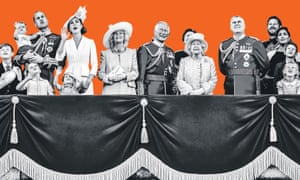'People will forgive you for being wrong, but they will never forgive you for being right - especially if events prove you right while proving them wrong.' Thomas Sowell
Search This Blog
Showing posts with label monarchy. Show all posts
Showing posts with label monarchy. Show all posts
Friday, 16 September 2022
Thursday, 13 June 2019
How the British royal family killed off republicanism
The democratic case against the monarchy is clear, but even Labour knows it would be electoral suicide to make it writes Larry Elliott in The Guardian
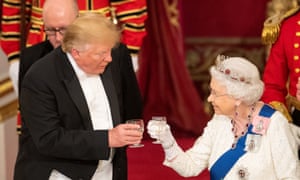
‘There was widespread praise for the way in which the Queen handled Trump.’ Photograph: Pool/Reuters
But while this was happening, the House of Windsor provided other struggling businesses with a masterclass in how to reinvent themselves. First, it understood that the underlying strength of the brand meant there was no need to panic. Britain has always tended to be a conservative country wary of radical change, which is one of the reasons the vote to leave the EU came as such a surprise in 2016. Despite all its problems in the 1990s – including the bitter divorce between Prince Charles and Diana, and the row over the Queen’s tax bill – there was always strong residual support for the monarchy. Had there been a referendum in 2000 on whether to have an elected head of state, it would almost certainly have gone in favour of the status quo.
Second, there was a change in the management team, with the older members of the royal family being replaced in the public spotlight by William and Harry. This was a smart move. The Windsors didn’t want to end up with all its most avid supporters gradually dying out: it saw the need to appeal to a younger audience.
If that meant embracing social media then so be it; the royals embraced new technology. Whereas previous royal babies have been announced through the mainstream media, the Duke and Duchess of Sussex announced the birth of their son on Instagram.
Third, the royals have had the nous to avail themselves of the best image consultants and PRs that money could buy. The idea has been to show that the new generation of royals – William and Kate, Harry and Meghan – have the same commitment to public duty as the Queen, but with a bit more of the touchy-feely empathy demanded today.
If it all seems to have worked, that is in large part due to the weakness of the competition. Persuading Britain to dispense with the monarchy would be tough in any circumstances. Persuading Britain to choose a replacement for the Queen from the current crop of politicians, tarnished as they are by economic torpor, the expenses scandal and Brexit, would be a complete non-starter.
In his diaries, Tony Benn describes watching the establishment gather for the service in St Paul’s cathedral to mark the Queen’s silver jubilee in 1977. “We haven’t removed the grip of this crowd from British society, far from it, but on the other hand the public accepts it all and the press plays it up to divert people from unemployment and the cost of living and the EEC and so on. It is a very important ingredient in British life and it has to be thought about.”
It certainly does need thinking about, but there will be no referendum on the monarchy’s future any time soon. There was no mention of republicanism in Labour’s 2017 election manifesto and it’s hard to envisage the next one being any different. As things stand, it would be electoral suicide.
‘Trump’s appearance highlighted that the monarchy has made itself virtually impregnable and that the republican cause in Britain has rarely been weaker.’ Composite: AFP/Getty Images/Guardian design
From Harry Truman to Donald Trump, there have been 13 US presidents since the Queen came to the throne in 1952, so she has plenty of practice in hosting a state visit for the world’s most powerful man. Unsurprisingly, Trump loved the British establishment making a fuss of him – from the 41-gun salute to the British lamb washed down with vintage claret at the Buck House white-tie banquet. Both Downing Street and the White House considered the trip a great success, with talk – wildly premature – of a giant Anglo-American free trade deal.
But the real winner from the visit was not a lame duck Theresa May or Trump – who quickly moved on to other things – but the royal family. There was widespread praise for the way in which the Queen handled Trump, even using her speech at the banquet to big up the international institutions he so frequently derides. The occasion also showcased one of the UK’s few world-class industries: heritage. Tourists are money, as someone once said.
But there was more to it than that. Trump’s appearance highlighted that the monarchy has made itself virtually impregnable and that the republican cause in Britain has rarely been weaker.
Things looked rather different a couple of decades ago. When Princess Diana died in a Paris car crash in 1997, the Queen seemed ill-prepared for the national blubathon that followed. Her initial response to her daughter-in-law’s death was seen as cold and insensitive and – after what today would be called a social media storm – she was forced to go in front of the cameras to quell the public outrage.
Tony Blair, newly arrived as prime minister, was seen to have better captured the public mood with his depiction of Diana as the “people’s princess”. More significantly, Blair’s government was committed to a package of constitutional reforms, including devolution for Scotland and Wales. This created the opportunity to have a debate about whether Britain could really be modernised if it remained a monarchy.
As it happened, Blair was a royalist and would never have countenanced the idea of turning Britain into a republic, but that didn’t prevent the idea being canvassed. In 2000, this paper called for a referendum on what sort of head of state Britain should have after the Queen’s death. “People ought to be able to say whether they would prefer to have an elected head of state or to continue with a monarchy. Do they want to be citizens or subjects?” we asked.
The arguments in favour of turning Britain into a republic are no different from what they were 19 years ago. They involve democracy, power, governance, class and distribution of wealth. It is difficult, if not impossible, to have a proper discussion about tackling inequality while leaving the monarchy out of the equation. But in 2000 there was a realistic possibility of change. The royal family was rather like one of those long-established high street businesses that have fallen on hard times as a result of the retail revolution. The product looked a bit out of date; those in charge of running the business were old and stale; customers seemed less happy with the service they were getting.
But since then, two things have buttressed the monarchy’s position. First, external events have been helpful. At the turn of the millennium, the world economy was in the middle of a long boom marked by rising living standards, low inflation and falling unemployment. The absence of an economic crisis created the political space to think about other issues. But since 2007, Britain has been in a semi-permanent state of economic and political crisis, with the deep recession of 2008-09 followed by post-2010 austerity and Brexit. Even had there been a growing drumbeat of support among voters for a republic, Westminster would have had other priorities.
From Harry Truman to Donald Trump, there have been 13 US presidents since the Queen came to the throne in 1952, so she has plenty of practice in hosting a state visit for the world’s most powerful man. Unsurprisingly, Trump loved the British establishment making a fuss of him – from the 41-gun salute to the British lamb washed down with vintage claret at the Buck House white-tie banquet. Both Downing Street and the White House considered the trip a great success, with talk – wildly premature – of a giant Anglo-American free trade deal.
But the real winner from the visit was not a lame duck Theresa May or Trump – who quickly moved on to other things – but the royal family. There was widespread praise for the way in which the Queen handled Trump, even using her speech at the banquet to big up the international institutions he so frequently derides. The occasion also showcased one of the UK’s few world-class industries: heritage. Tourists are money, as someone once said.
But there was more to it than that. Trump’s appearance highlighted that the monarchy has made itself virtually impregnable and that the republican cause in Britain has rarely been weaker.
Things looked rather different a couple of decades ago. When Princess Diana died in a Paris car crash in 1997, the Queen seemed ill-prepared for the national blubathon that followed. Her initial response to her daughter-in-law’s death was seen as cold and insensitive and – after what today would be called a social media storm – she was forced to go in front of the cameras to quell the public outrage.
Tony Blair, newly arrived as prime minister, was seen to have better captured the public mood with his depiction of Diana as the “people’s princess”. More significantly, Blair’s government was committed to a package of constitutional reforms, including devolution for Scotland and Wales. This created the opportunity to have a debate about whether Britain could really be modernised if it remained a monarchy.
As it happened, Blair was a royalist and would never have countenanced the idea of turning Britain into a republic, but that didn’t prevent the idea being canvassed. In 2000, this paper called for a referendum on what sort of head of state Britain should have after the Queen’s death. “People ought to be able to say whether they would prefer to have an elected head of state or to continue with a monarchy. Do they want to be citizens or subjects?” we asked.
The arguments in favour of turning Britain into a republic are no different from what they were 19 years ago. They involve democracy, power, governance, class and distribution of wealth. It is difficult, if not impossible, to have a proper discussion about tackling inequality while leaving the monarchy out of the equation. But in 2000 there was a realistic possibility of change. The royal family was rather like one of those long-established high street businesses that have fallen on hard times as a result of the retail revolution. The product looked a bit out of date; those in charge of running the business were old and stale; customers seemed less happy with the service they were getting.
But since then, two things have buttressed the monarchy’s position. First, external events have been helpful. At the turn of the millennium, the world economy was in the middle of a long boom marked by rising living standards, low inflation and falling unemployment. The absence of an economic crisis created the political space to think about other issues. But since 2007, Britain has been in a semi-permanent state of economic and political crisis, with the deep recession of 2008-09 followed by post-2010 austerity and Brexit. Even had there been a growing drumbeat of support among voters for a republic, Westminster would have had other priorities.

‘There was widespread praise for the way in which the Queen handled Trump.’ Photograph: Pool/Reuters
But while this was happening, the House of Windsor provided other struggling businesses with a masterclass in how to reinvent themselves. First, it understood that the underlying strength of the brand meant there was no need to panic. Britain has always tended to be a conservative country wary of radical change, which is one of the reasons the vote to leave the EU came as such a surprise in 2016. Despite all its problems in the 1990s – including the bitter divorce between Prince Charles and Diana, and the row over the Queen’s tax bill – there was always strong residual support for the monarchy. Had there been a referendum in 2000 on whether to have an elected head of state, it would almost certainly have gone in favour of the status quo.
Second, there was a change in the management team, with the older members of the royal family being replaced in the public spotlight by William and Harry. This was a smart move. The Windsors didn’t want to end up with all its most avid supporters gradually dying out: it saw the need to appeal to a younger audience.
If that meant embracing social media then so be it; the royals embraced new technology. Whereas previous royal babies have been announced through the mainstream media, the Duke and Duchess of Sussex announced the birth of their son on Instagram.
Third, the royals have had the nous to avail themselves of the best image consultants and PRs that money could buy. The idea has been to show that the new generation of royals – William and Kate, Harry and Meghan – have the same commitment to public duty as the Queen, but with a bit more of the touchy-feely empathy demanded today.
If it all seems to have worked, that is in large part due to the weakness of the competition. Persuading Britain to dispense with the monarchy would be tough in any circumstances. Persuading Britain to choose a replacement for the Queen from the current crop of politicians, tarnished as they are by economic torpor, the expenses scandal and Brexit, would be a complete non-starter.
In his diaries, Tony Benn describes watching the establishment gather for the service in St Paul’s cathedral to mark the Queen’s silver jubilee in 1977. “We haven’t removed the grip of this crowd from British society, far from it, but on the other hand the public accepts it all and the press plays it up to divert people from unemployment and the cost of living and the EEC and so on. It is a very important ingredient in British life and it has to be thought about.”
It certainly does need thinking about, but there will be no referendum on the monarchy’s future any time soon. There was no mention of republicanism in Labour’s 2017 election manifesto and it’s hard to envisage the next one being any different. As things stand, it would be electoral suicide.
Saturday, 9 April 2016
Sunday, 14 June 2015
From Fifa to Tony Blair — I’ve tried to understand the rich, but I just can't
Yasmin Alibhai Brown in the Independent
Tony Blair is a very busy man – so many calling on him, so little time. He had, apparently, agreed to speak at a conference on world hunger in Stockholm. Last year his very good friend Bill Clinton spoke at this same gathering, organised by Eat, a non-profit organisation set up by Swedish philanthropists. But a slight hitch came up with the Blair booking: reports suggest our erstwhile PM allegedly wanted £330,000 for a 20-minute sermon. (Clinton got £327,000 for 30 minutes.) Eat thought the fee too high, although Blair’s office insists money wasn’t spoken of and he simply had a previous engagement.
For whatever reason, Blair will not now orate stirringly on how to save the millions who live on less than 82 pence per day. Tony’s office says the money was to go to the Cherie Blair Foundation for Women. But like cheap room deodorisers, that late fragrance of good intent cannot overpower the bad smell coming from this story.
The Fifa drama is also all about money. Football does not even have a bit part. All the top men drive fast in the fog of power and wealth, without a moral compass, and still pretend that they are maligned heroes. Prince William lectures them about probity and corruption without so much as a second thought for the royal finances and tax secrecy.
This week also had Iain Duncan Smith, a fervent Catholic and man of some wealth, considering draconian child benefit restrictions. To save £2.5bn per year he wants to cut the payment from £20.70 for the first child to £13.70 – and is also looking at restricting benefits to two children. To this quiet man, poverty must be as hard to understand as godlessness.
Meanwhile, well-heeled George Osborne is to meet the Queen to review grants given to the royals. The boilers are too old, the energy bills for all those palaces too high. Unlike other pensioners, our monarch will not have to resort to hot water bottles, of that we can be sure. Nor will she visit those in her kingdom who shiver day and night, have barely enough to eat and live in rat-infested rooms.
This was also the week when Thomas Cook was humbled after failing to respond with basic humanity to the parents of two young children who died of carbon monoxide poisoning in a Corfu hotel.
I find all this alien and deeply baffling. How do the rich think? How are they so solipsistic, so self-serving and self-promoting? Are they born that way or are they raised as members of a particularly hard tribe? We must try to understand people who have it all, now that we are to be governed by a clique of the very privileged.
And so, in that spirit, I made myself read a column penned by entrepreneur Luke Johnson, son of Paul Johnson, the former editor of the New Statesman who walked briskly rightwards to become an ardent Tory.
To be successful, you need a dream team, sayest Luke, a blue-eyed dynamo and chairman of Risk Capital Partners: “First and foremost is the spouse... to provide emotional and practical backing. Self-employment can be desolate. Most entrepreneurs are obsessives, and often selfish in the pursuit of their ambitions. They require a tolerant spouse to provide relief...” Also a devoted “Super PA”. I gave up reading halfway through, because the man was so unutterably self-satisfied. Getting into these mindsets is harder than I thought.
Now, most Ugandan Asians are natural-born moneymakers. The exiles who were resented and unwanted in 1972 have made good. Many are millionaires and right wing. Like the Tory minister Priti Patel, too many of my ex-compatriots believe in self-reliance, low taxes, hard punishment and a social Darwinism. Benefits, in their view, only encourage layabouts and wastrels.
I had relatives back in Uganda who lived in grand houses, paid no tax and expected deference. Among my classmates, a few became doctors, the rest went into business and, yes, made bucks. I think I was born with a mutant gene.
Two guys with big money offered to marry me. One still hoots when he sees my Nissan Micra and always follows up with some unsolicited advice: “You are clever and very stupid. Money would make you powerful.
“All these politicians come to us. They don’t read your words – who cares about what you say? We make the world go round. You, your type, and lazy bastards on benefits make it slow down. You should be worshipping us.” So glad I didn’t marry the bald, fat scumbag.
These capitalists really do see themselves as redeemers, even those who pay their staff the lowest wages and do little to make the world a better place. Men such as Bill Gates do use their money to alleviate poverty, but they are rare.
The rest, even when they give cash, want something in return – an honour, a name on some grand wall, a PR victory. Sure, if they help the arts or the unemployed, give them the accolades and respect they crave. But what of the CEOs and shareholders who feel no social obligations, yet want more gratitude or see themselves as victims of deep ingratitude?
Tom Perkins, a US venture capitalist, complained that the recent war on the rich was like “the Holocaust”. (He later apologised.) Sam Zell, the American chief executive of an equity company – and a zealous defender of the top one per cent of global earners – says “subsidising people and disincentivising [the poor]” through benefits is the problem. Those who don’t succeed don’t want to try.
I read books on the minds and methods of the rich. They think selfishness is a virtue and that poverty (not money) is the root of all evil, that it is the end not the means which matter and that welfare for failure leads to more failure. They belong only to each other. The wider good does not exist. I see that now.
The future – political and economic – belongs to these masters of the universe. There is no alternative, no fight back. Even Labour now sucks up to them. Bleak times.
Tony Blair is a very busy man – so many calling on him, so little time. He had, apparently, agreed to speak at a conference on world hunger in Stockholm. Last year his very good friend Bill Clinton spoke at this same gathering, organised by Eat, a non-profit organisation set up by Swedish philanthropists. But a slight hitch came up with the Blair booking: reports suggest our erstwhile PM allegedly wanted £330,000 for a 20-minute sermon. (Clinton got £327,000 for 30 minutes.) Eat thought the fee too high, although Blair’s office insists money wasn’t spoken of and he simply had a previous engagement.
For whatever reason, Blair will not now orate stirringly on how to save the millions who live on less than 82 pence per day. Tony’s office says the money was to go to the Cherie Blair Foundation for Women. But like cheap room deodorisers, that late fragrance of good intent cannot overpower the bad smell coming from this story.
The Fifa drama is also all about money. Football does not even have a bit part. All the top men drive fast in the fog of power and wealth, without a moral compass, and still pretend that they are maligned heroes. Prince William lectures them about probity and corruption without so much as a second thought for the royal finances and tax secrecy.
This week also had Iain Duncan Smith, a fervent Catholic and man of some wealth, considering draconian child benefit restrictions. To save £2.5bn per year he wants to cut the payment from £20.70 for the first child to £13.70 – and is also looking at restricting benefits to two children. To this quiet man, poverty must be as hard to understand as godlessness.
Meanwhile, well-heeled George Osborne is to meet the Queen to review grants given to the royals. The boilers are too old, the energy bills for all those palaces too high. Unlike other pensioners, our monarch will not have to resort to hot water bottles, of that we can be sure. Nor will she visit those in her kingdom who shiver day and night, have barely enough to eat and live in rat-infested rooms.
This was also the week when Thomas Cook was humbled after failing to respond with basic humanity to the parents of two young children who died of carbon monoxide poisoning in a Corfu hotel.
I find all this alien and deeply baffling. How do the rich think? How are they so solipsistic, so self-serving and self-promoting? Are they born that way or are they raised as members of a particularly hard tribe? We must try to understand people who have it all, now that we are to be governed by a clique of the very privileged.
And so, in that spirit, I made myself read a column penned by entrepreneur Luke Johnson, son of Paul Johnson, the former editor of the New Statesman who walked briskly rightwards to become an ardent Tory.
To be successful, you need a dream team, sayest Luke, a blue-eyed dynamo and chairman of Risk Capital Partners: “First and foremost is the spouse... to provide emotional and practical backing. Self-employment can be desolate. Most entrepreneurs are obsessives, and often selfish in the pursuit of their ambitions. They require a tolerant spouse to provide relief...” Also a devoted “Super PA”. I gave up reading halfway through, because the man was so unutterably self-satisfied. Getting into these mindsets is harder than I thought.
Now, most Ugandan Asians are natural-born moneymakers. The exiles who were resented and unwanted in 1972 have made good. Many are millionaires and right wing. Like the Tory minister Priti Patel, too many of my ex-compatriots believe in self-reliance, low taxes, hard punishment and a social Darwinism. Benefits, in their view, only encourage layabouts and wastrels.
I had relatives back in Uganda who lived in grand houses, paid no tax and expected deference. Among my classmates, a few became doctors, the rest went into business and, yes, made bucks. I think I was born with a mutant gene.
Two guys with big money offered to marry me. One still hoots when he sees my Nissan Micra and always follows up with some unsolicited advice: “You are clever and very stupid. Money would make you powerful.
“All these politicians come to us. They don’t read your words – who cares about what you say? We make the world go round. You, your type, and lazy bastards on benefits make it slow down. You should be worshipping us.” So glad I didn’t marry the bald, fat scumbag.
These capitalists really do see themselves as redeemers, even those who pay their staff the lowest wages and do little to make the world a better place. Men such as Bill Gates do use their money to alleviate poverty, but they are rare.
The rest, even when they give cash, want something in return – an honour, a name on some grand wall, a PR victory. Sure, if they help the arts or the unemployed, give them the accolades and respect they crave. But what of the CEOs and shareholders who feel no social obligations, yet want more gratitude or see themselves as victims of deep ingratitude?
Tom Perkins, a US venture capitalist, complained that the recent war on the rich was like “the Holocaust”. (He later apologised.) Sam Zell, the American chief executive of an equity company – and a zealous defender of the top one per cent of global earners – says “subsidising people and disincentivising [the poor]” through benefits is the problem. Those who don’t succeed don’t want to try.
I read books on the minds and methods of the rich. They think selfishness is a virtue and that poverty (not money) is the root of all evil, that it is the end not the means which matter and that welfare for failure leads to more failure. They belong only to each other. The wider good does not exist. I see that now.
The future – political and economic – belongs to these masters of the universe. There is no alternative, no fight back. Even Labour now sucks up to them. Bleak times.
Thursday, 3 October 2013
The Daily Mail may not realise, but Marxists are patriots
The traducing of Ralph Miliband is a reminder of how far we now are from understanding socialism
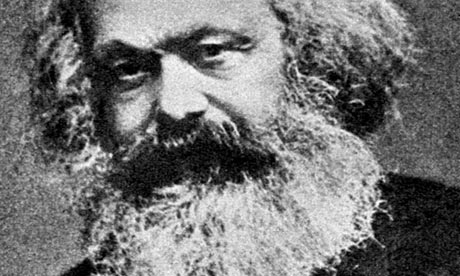
‘The record sales of Marx's Das Kapital in the last few years indicates that people are turning again to an analysis of the exploitative logic of capitalism that remains singularly accurate and powerful.' Photograph: PA
Whatever their views of him, most decent people backed Ed Miliband this week as he defended his father against jingoist attacks on him by the Daily Mail. The Labour leader angrily described Ralph Miliband as a British patriot, and correctly noted that he does not share his father's principled commitment to socialism. Labour is right to demand an apology from the Mail, not only for a frankly bigoted attack on a respected Jewish intellectual, but also for claiming that the party's politics bear any resemblance to the socialism it formally abandoned nearly two decades ago.
The defence of Ralph Miliband runs along wearyingly familiar lines – that he unambiguously proved his patriotism by fighting in the anti-Nazi war, which along with "no apology for the empire" has become the principal litmus test for love of Britain. His lifelong commitment to a supple Marxism is noted but quietly skimmed over as an embarrassingly anachronistic aspect of an otherwise decent and loyal man. Yet a defence of Miliband senior which does not also challenge the red-bashing that often goes hand in hand with antisemitism is, at best, equivocal. More perniciously, it accepts the distorted terms set by the rightwing press which defines patriotism narrowly through obedient adulation of monarchy, militarism and elitism.
Ralph Miliband was not a patriot because he served in the navy. He was a lover of this country and its people precisely because he understood that institutions like the monarchy and the House of Lords symbolise and perpetuate inequality, and that militarism usually encourages the poor to die defending the interests of the privileged. Hispatriotism has more in common with long progressive patriotic traditions in Britain, from the Diggers and Levellers to the Chartists and anti-privatisation campaigners. It was about claiming land and country for the majority of its labouring denizens rather than the plutocrats and the powerful who live off the fat of the land while spouting an insincere "nationalism" which serves less to create collective wellbeing than to prevent their privileges being questioned.
Even while noting that Ralph criticised Eric Hobsbawm for not repudiating Stalinism, the Daily Mail recyles the false charge that adherence to Marxism is indistinguishable from commitment to a poisonous Sovietism. This is no different from claiming that Christianity is indistinguishable from the bloody crusades and inquisitions conducted by some of its adherents. However, Ralph Miliband would also have found his son's claim that capitalism can be "made to work for working people" incoherent, and wilfully ignorant of how capitalism actually works, constitutively reliant as it is on concentrating wealth among relatively few while extracting the labour of the many.
For years, captains of corporations in the affluent west have been able to peddle the myth that capitalism can be made to work for everyone by outsourcing its most exploitative aspects to other parts of the world, extracting both resources and labour ruthlessly. Now, however – as the centre of capitalist gravity shifts southwards, the western social democratic compact unravels, and the foundations of the welfare state are disastrously undermined – it will be less easy to keep up this pretence of affluence for all.
The record sales of Marx's Das Kapital in the last few years alone indicate that people are turning once again to an analysis of the fundamentally exploitative logic of capitalism that, for all its relentless bad press, remains singularly accurate and powerful.
It is time to junk the cheap and facile propaganda that socialism is reducible to Stalinist depredations. In Ralph Miliband's own anti-Stalinist understanding, socialism was about "the wholesale transformation of the social order" by giving ordinary people control over the economic system, fully democratising a political system in which ordinary citizens feel disenfranchised and helpless, and ensuring "a drastic levelling out of social inequality". It is the abandonment of these democratic aspirations for the craven pieties of the Daily Mail that must really "disturb everyone who loves this country".
Monday, 1 July 2013
Who owns patriotism?
People count, not battles – yet the right, looking back in wonder, seems only to love only a sliver of Britain
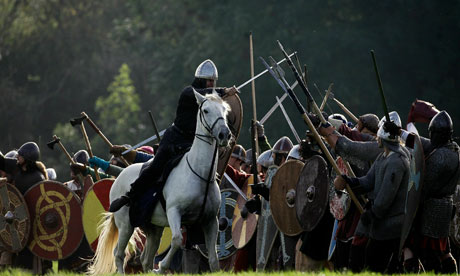
Enthusiasts dressed as Saxon and Norman warriors re-enact the 1066 battle of Hastings. Photograph: Matthew Lloyd/Getty Images
George Osborne has pledged £1m to restore the battlefield of Waterloo (1815) in Belgium, which paves the way for the restoration of the sites of all kinds of victories abroad; ministers are also excited about Agincourt (1415). If they continue on this trajectory, the Tories will eventually find themselves back at Hastings (1066), which should really mash their heads. (I think they have been watching the White Queen too much, which is a shame, because TV history has the same relationship to real history as gastronomy has to kebab vans.)
I am not sure how this works – how do you renovate a battlefield, anyway? – and I admit to limited faith in such memorials. They have too many emergency exits for places that have witnessed catastrophe, and too many children throwing chips. I would always prefer a book to a battlefield, if I could find a decent public library. Mud doesn't do analysis, and tea shops illuminate nothing. This is the politics of the National Trust.
It is clearly part of the Tory plan to make Britain feel like a wonderful country, even though it may not feel that wonderful beyond Whitehall: food banks; rising inequality; homelessness; and the ghastly spectacle of the wealthy enjoying a parody of homelessness by camping at Glastonbury in yurts, and treating litter as a sort of fascinating art installation that somebody else will buy.
Surely we must agree with Edmund Burke when he said: "To make us love our country, our country ought to be lovely"? No, that is too complicated and presumably expensive; it is better to look to the past when the future seems so foul, and austerity stretches into the horizon like an ever-receding phantom. We have the horrid plan to send children from state schools to the battlefields of the western front – and the second prize is? – and we have Michael Gove, a man who always looks, to me, in need of a chin to stroke, attempting to rewrite the national curriculum in the style of Enoch Powell drugged by Jean Plaidy.
Who owns patriotism? The left has been too quick to surrender its spoils to the right, largely because so many progressive ideas came from across the Channel, along with the plague. (Did you know the plague ship docked at Weymouth? That is surely worth a plaque). Socialism's relationship to internationalism did it harm, although it should not have done, because the right's definition of patriotism is elitist, confused and often completely bogus. Nigel Farage of Ukip, who is considered dangerously patriotic, at least by the Tories, based more on his ownership of a Barbour, I think, than on any coherent political philosophy, is exposed as a (failed) tax avoider – how patriotic! – and the track where Jessica Ennis trained will be shuttered, due to the cuts.
Obviously monarchy confounds everything, because it drugs us into confusing love of country with hierarchy, obedience and submission; too often patriotism simply means surrender to the status quo. To applaud the monarchy for spending £5,000 a night on the Duchess of Cambridge's lying-in, for instance, might be considered patriotic, while to complain that she should make do with a world famous NHS hospital is not. Patriotism stripped of proper definition is a cheap political trick and it lies all the time; who remembers, for instance, that in Churchill's five-man war cabinet of 1940, two Tories (Chamberlain and Halifax) were for negotiating with Hitler and two Labour men (Attlee and Greenwood) were not?
It is obvious that the right loves only a sliver of Britain; and so it is time for Labour to claim patriotism for itself. It began with Ed Miliband's theft of Disraeli's One Nation creed at the party's 2012 conference, which is not as improper as it sounds; Disraeli toyed with many things before he chose Toryism, and his series of progressive social reforms were a Victorian marvel.
Ed Balls has called for Labour to "recapture the spirit and values and national purpose" of 1945; translate the rhetoric into policy and who knows what worlds we could build? A patriotic nation loves all its citizens, and does not only look back in wonder. Greatness lives in the day; even dogs know that.
Wednesday, 7 November 2012
The UK's Protection racket in the Middle East
The Gulf protection racket is corrupt and dangerous folly
Sooner or later the Arab despots David Cameron is selling arms to will fall, and the states that backed them will pay the price
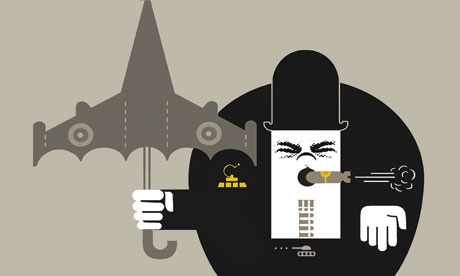
Illustration by Helen Wakefield
On the nauseating political doublespeak scale, David Cameron's claim to "support the Arab spring" on a trip to sell weapons to Gulf dictators this week hit a new low. No stern demands for free elections from the autocrats of Arabia – or calls for respect for human rights routinely dished out even to major powers like Russia and China.
As the kings and emirs crack down on democratic protest, the prime minister assured them of his "respect and friendship". Different countries, he explained soothingly in Abu Dhabi, needed "different paths, different timetables" on the road to reform: countries that were western allies, spent billions on British arms and sat on some of the world's largest oil reserves in particular, he might have added by way of explanation.
Cameron went to the Gulf as a salesman for BAE Systems – the private arms corporation that makes Typhoon jets – drumming up business from the United Arab Emirates, Saudi Arabia and Oman, as well as smoothing ruffled feathers over British and European parliamentary criticism of their human rights records on behalf of BP and other companies.
No wonder the prime minister restricted media coverage of the jaunt. But, following hard on the heels of a similar trip by the French president, the western message to the monarchies was clear enough: Arab revolution or not, it's business as usual with Gulf despots.
The spread of protest across the Arab world has given these visits added urgency. A year ago, in the wake of the uprisings in Tunisia and Egypt, it seemed the Gulf regimes and their western backers had headed off revolt by crushing it in Bahrain, buying it off in Saudi Arabia, and attempting to hijack it in Libya and then Syria – while successfully playing the anti-Shia sectarian card.
But popular unrest has now reached the shores of the Gulf. In Kuwait, tens of thousands of demonstrators, including Islamists, liberals and nationalists, have faced barrages of teargas and stun grenades as they protest against a rigged election law, while all gatherings of more than 20 have been banned.
After 18 months of violent suppression of the opposition in Bahrain, armed by Britain and America, the regime has outlawed all anti-government demonstrations. In western-embraced Saudi Arabia, protests have been brutally repressed, as thousands are held without charge or proper trial.
Meanwhile, scores have been jailed in the UAE for campaigning for democratic reform, and in Britain's favourite Arab police state of Jordan, protests have mushroomed against a Kuwaiti-style electoral stitchup. London, Paris and Washington all express concern – but arm and back the autocrats.
Cameron insists they need weapons to defend themselves. When it comes to the small arms and equipment Britain and the US supply to Saudi Arabia, Bahrain and other Gulf states, he must mean from their own people. But if he's talking about fighter jets, they're not really about defence at all.
This is effectively a mafia-style protection racket, in which Gulf regimes use oil wealth their families have commandeered to buy equipment from western firms they will never use. The companies pay huge kickbacks to the relevant princelings, while a revolving door of political corruption provides lucrative employment for former defence ministers, officials and generals with the arms corporations they secured contracts for in office.
Naturally, western leaders and Arab autocrats claim the Gulf states are threatened by Iran. In reality, that would only be a risk if the US or Israel attacked Iran – and in that case, it would be the US and its allies, not the regimes' forces, that would be defending them. Hypocrisy doesn't begin to describe this relationship, which has long embedded corruption in a web of political, commercial and intelligence links at the heart of British public life.
But support for the Gulf dictatorships – colonial-era feudal confections built on heavily exploited foreign workforces – is central to western control of the Middle East and its energy resources. That's why the US has major military bases in Kuwait, Qatar, the UAE, Oman and Bahrain.
The danger now is of escalating military buildup against Iran and intervention in the popular upheavals that have been unleashed across the region. Both the US and Britain have sent troops to Jordan in recent months to bolster the tottering regime and increase leverage in the Syrian civil war. Cameron held talks with emirates leaders this week about setting up a permanent British military airbase in the UAE.
The prime minister defended arms sales to dictators on the basis of 300,000 jobs in Britain's "defence industries". Those numbers are inflated and in any case heavily reliant on government subsidy. But there's also no doubt that British manufacturing is over-dependent on the arms industry and some of that support could usefully be diverted to, say, renewable technologies.
But even if morality and corruption are dismissed as side issues, the likelihood is that, sooner or later, these autocrats will fall – as did the Shah's regime in Iran, on which so many British and US arms contracts depended at the time. Without western support, they would have certainly been toppled already. As Rached Ghannouchi, the Tunisian leader whose democratic Islamist movement was swept to power in elections last year, predicted: "Next year it will be the turn of monarchies." When that happens, the western world risks a new backlash from its leaders' corrupt folly.
Subscribe to:
Comments (Atom)
